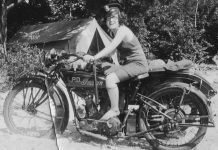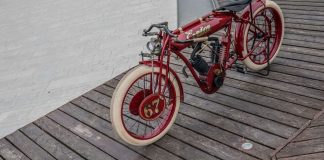
It was 1949 and Indian Motorcycle was struggling. It was so bad that the company could not fulfill the orders it had from, all-important police and other commercial entities. West Coast distributor Hap Alzina got the news and selflessly shipped huge stocks of parts he had in his West Coast warehouse, just so Indian could build bikes to fulfill its orders. Then, not long after that, Alzina learned that Indian was to the point of being so cash strapped, it wasn’t going to be able to meet payroll. Again, Alzina went into action to try to save the manufacturer, by placing a massive advance order, well over his normal allotment, just so Indian would have an instant cash infusion and be able to pay its employees.
Alzina’s ardent devotion to Indian motorcycles went back to the early years of America’s first major motorcycle company. When he was just 15 years old, he bought he first Indian and he loved it. So much so that when he was 17, he took a job as a mechanic for an Indian dealership in San Francisco and quickly worked his way up to service manager.
Born on September 14, 1894, Loris Alzina’s interest in motorcycling began early in life. As a boy he bought his first motorcycle, a Reading-Standard, for $50. In 1909, Alzina’s family moved from Santa Cruz, California, to San Francisco. There, he bought his first Indian from C.C. Hopkins, who was the Indian distributor for Northern California at the time. It was for Hopkins’ agency that Alzina began working for Indian.
Alzina spent 56 years devoting himself to motorcycling. Involved in motorcycling from its infancy, he is best known for being the western states distributor for Indian and, later, BSA. He oversaw the sales of those brands during the height of their popularity. Alzina — who earned the nickname “Hap” from his good-natured attitude — also sponsored many of the top AMA professional racers.
In the early 1910s, racing was becoming increasing popular and Alzina tried his hand in competition. He did some flat-track racing, but his primary interest was endurance runs. Alzina raced in many of the early desert city-to-city runs that were popular at the time. In 1919, Alzina edged well known racers Wells Bennett and Cannonball Baker to win the prestigious San Francisco Motorcycle Club Two-Day Endurance Run. That was a huge upset victory over two very popular racers. Of the 30 starters in the 680-mile endurance event, only seven riders managed to finish. Competitors had to battle against rain, hail, snow and even a landslide during the February contest. One rider slid off a muddy wooden bridge and was injured when he fell into the creek below. Alzina overcame those obstacles to earn a perfect score, riding an Indian sidecar outfit. Bennett, riding an Excelsior and Baker, on a factory-backed Indian, were on solo machines.
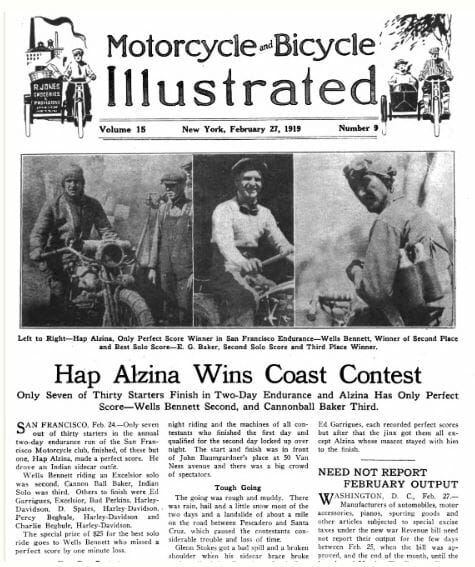
Alzina’s 1919 endurance victory was his biggest achievement as a competitor and it made him a popular name by way of win ads in motorcycle magazines across the country.
A few years before his big race win, Alzina opened his own dealership, selling Reading-Standard and Cleveland motorcycles. That enterprise was short-lived due to the onset on World War I. After closing his shop, Alzina again worked as sales manager for San Francisco’s Indian distributor. In 1922, Alzina saw a golden opportunity across the Bay in Oakland and bought out the dealership of E.S. Rose. Alzina turned the struggling franchise into a very successful business.
Alzina’s business expertise was recognized by Indian. In 1925, the company assigned him all of Northern California’s distribution. The next year, he was given the entire state, and by 1927 his territory expanded to include Nevada, Arizona and Washington. By 1948, Indian sales in Alzina’s territory represented over 20 percent of Indian’s total worldwide volume.
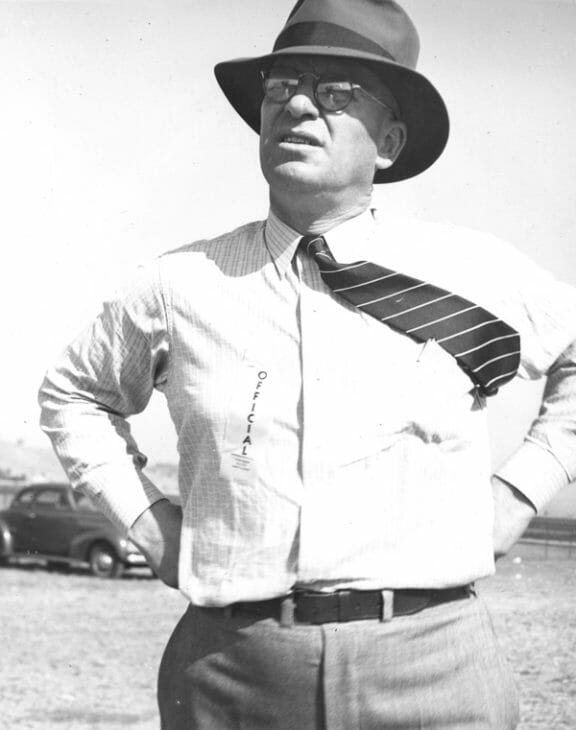
At the age of 54, moved on to another business venture and bought the western states distribution rights for BSA motorcycles from Alf “Rich” Child in 1949. The growth in motorcycling over the next 15 years was explosive. Under Alzina’s direction, BSA’s western distribution went from three dealerships to 265 dealers in 20 states. The move to BSA helped keep him in the motorcycle business even after his beloved Indian failed in the mid-1950s.
Alzina was an enthusiastic supporter of racing. Many racing stars such as Ed Kretz, Gene Thiessen, Al Gunter, Dick Mann, Kenny Eggers and Sammy Tanner credited Alzina for being a big part of their success. Several of those riders worked in Alzina’s shop and were allowed generous time away to travel to races.
At one point, Alzina also served as Vice President of the AMA.
Famous for his practical jokes, Alzina once walked a horse through a plush New York hotel lobby, pushing the horse into an elevator and taking him up to a room where a party was going on. He also enjoyed marking “Private & Confidential” on the address side of post cards so that everyone would be sure to read the card.
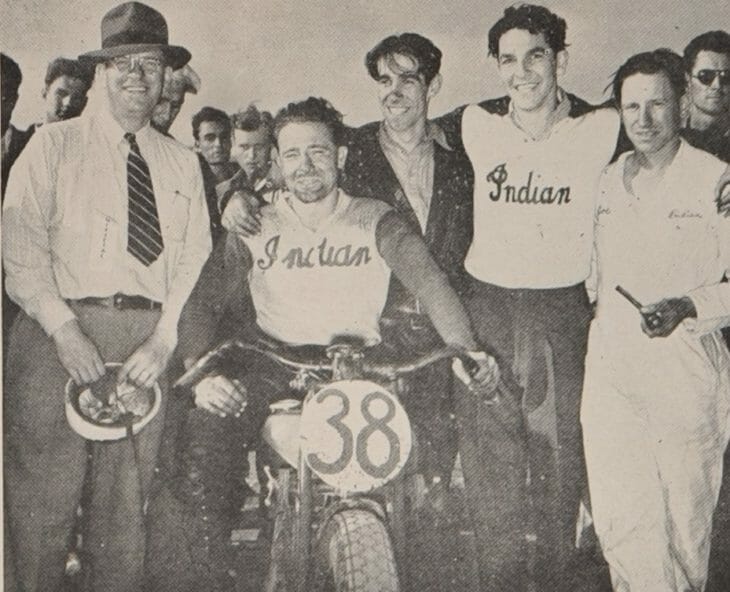
Alzina retired in 1965. He and his wife, Lillian, enjoyed traveling together, visiting friends across the country during their retirement years. He was given an Award of Merit from the AMA on behalf of its 70,000 members upon his retirement.
He was by a journalist if he viewed motorcycling as more business or pleasure.
“Motorcycles are a business,” he said. “But now, as you’re asking questions and I look back over the years, I call it 40 years of fun.”
Alzina died on July 21, 1970 at the age of 75. He will always be remembered as a man of integrity, honesty, loyalty, foresight, common sense and hard work. He was also a one of Indian’s most passionate supporters. He was inducted into the first class of the Motorcycle Hall of Fame in 1998.
Larry Lawrence | Archives Editor – Cycle World In addition to writing our Archives section on a weekly basis, Lawrence is another who is capable of covering any event we throw his way.



